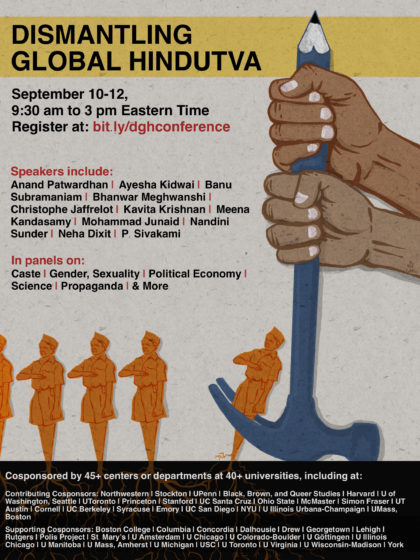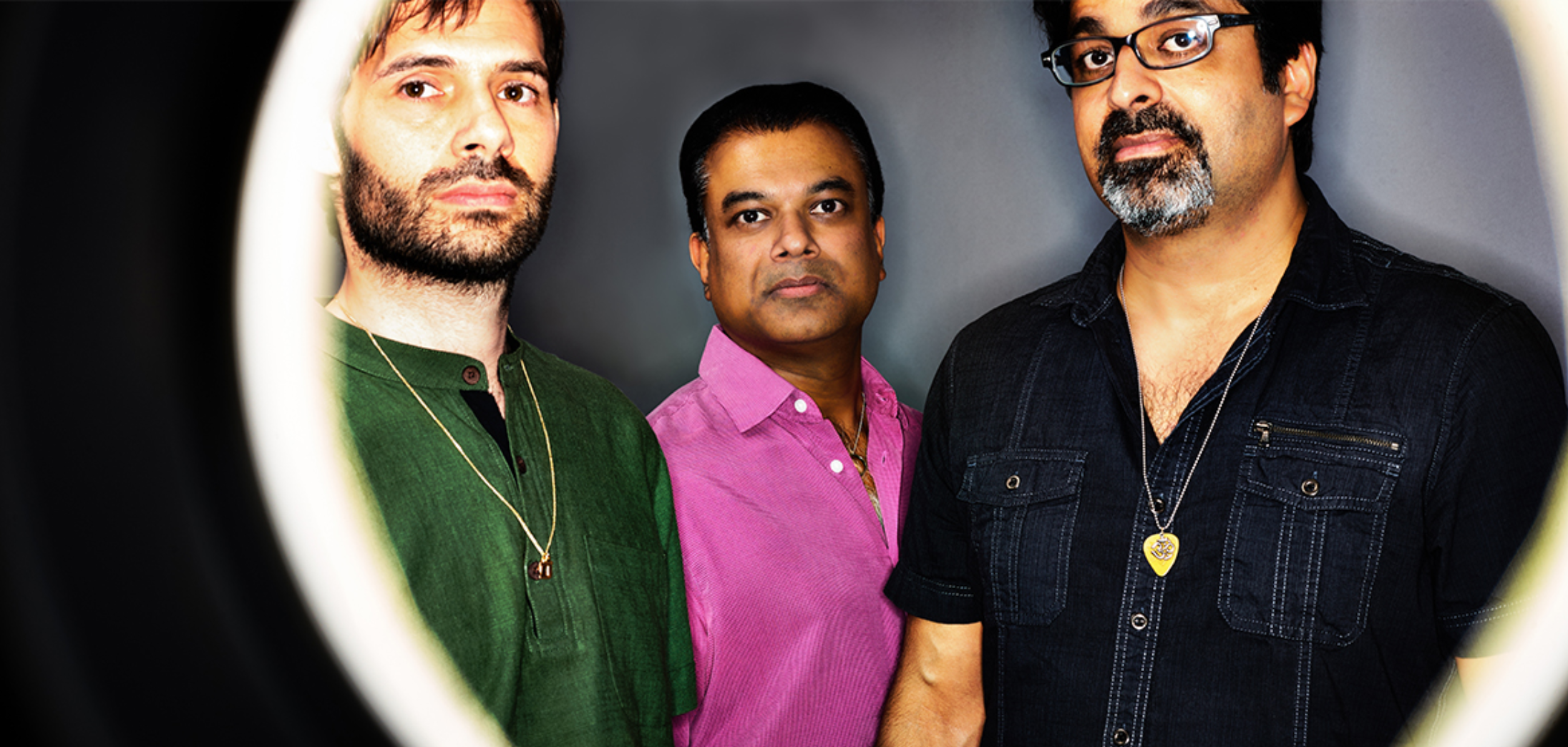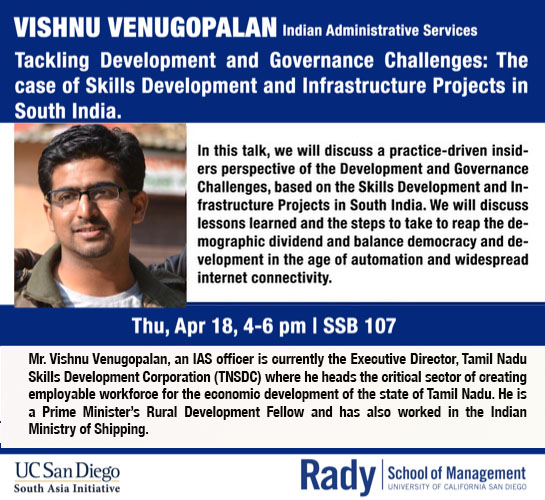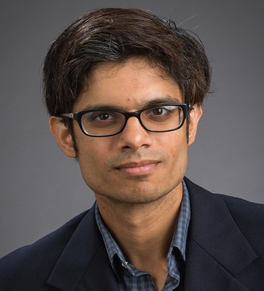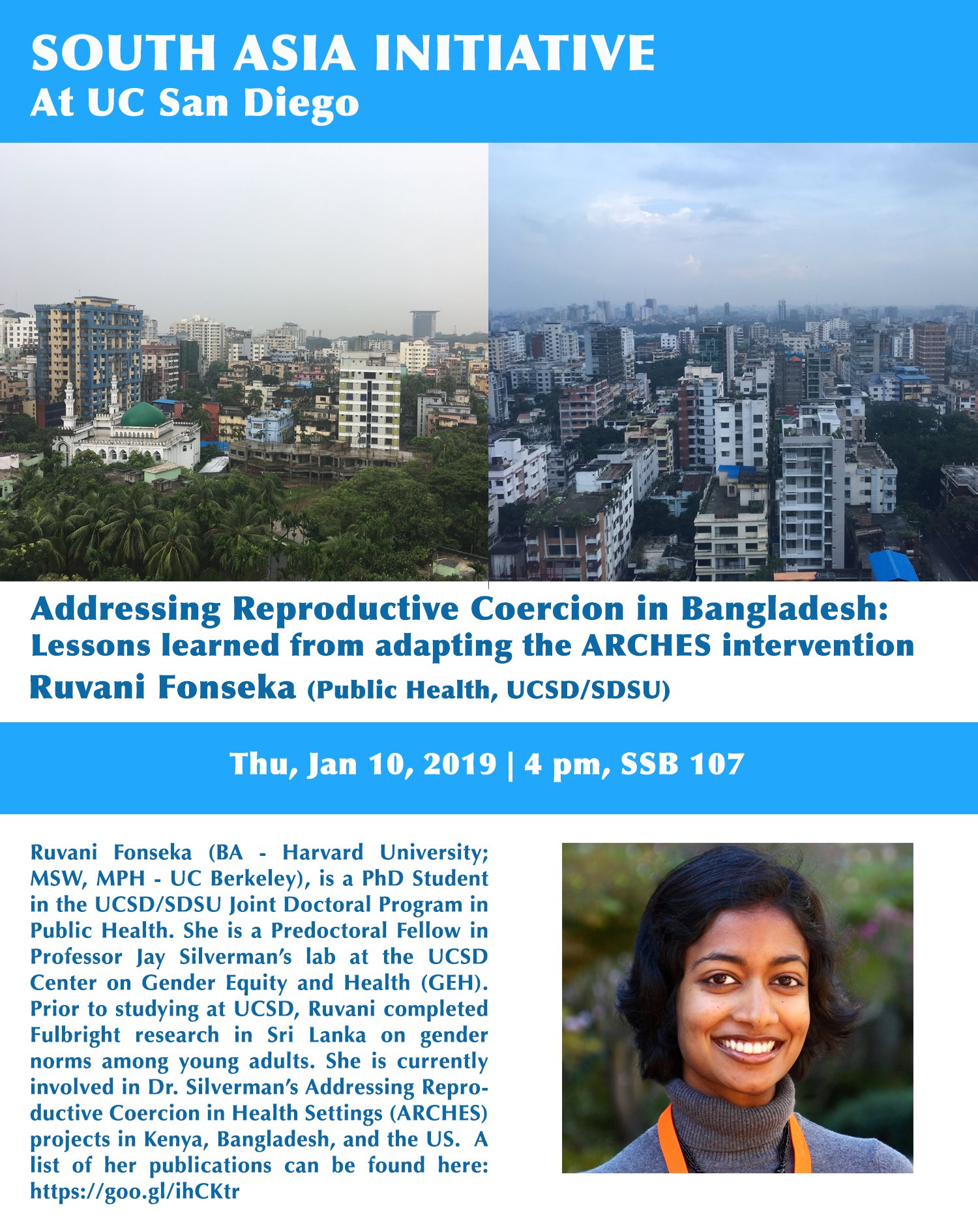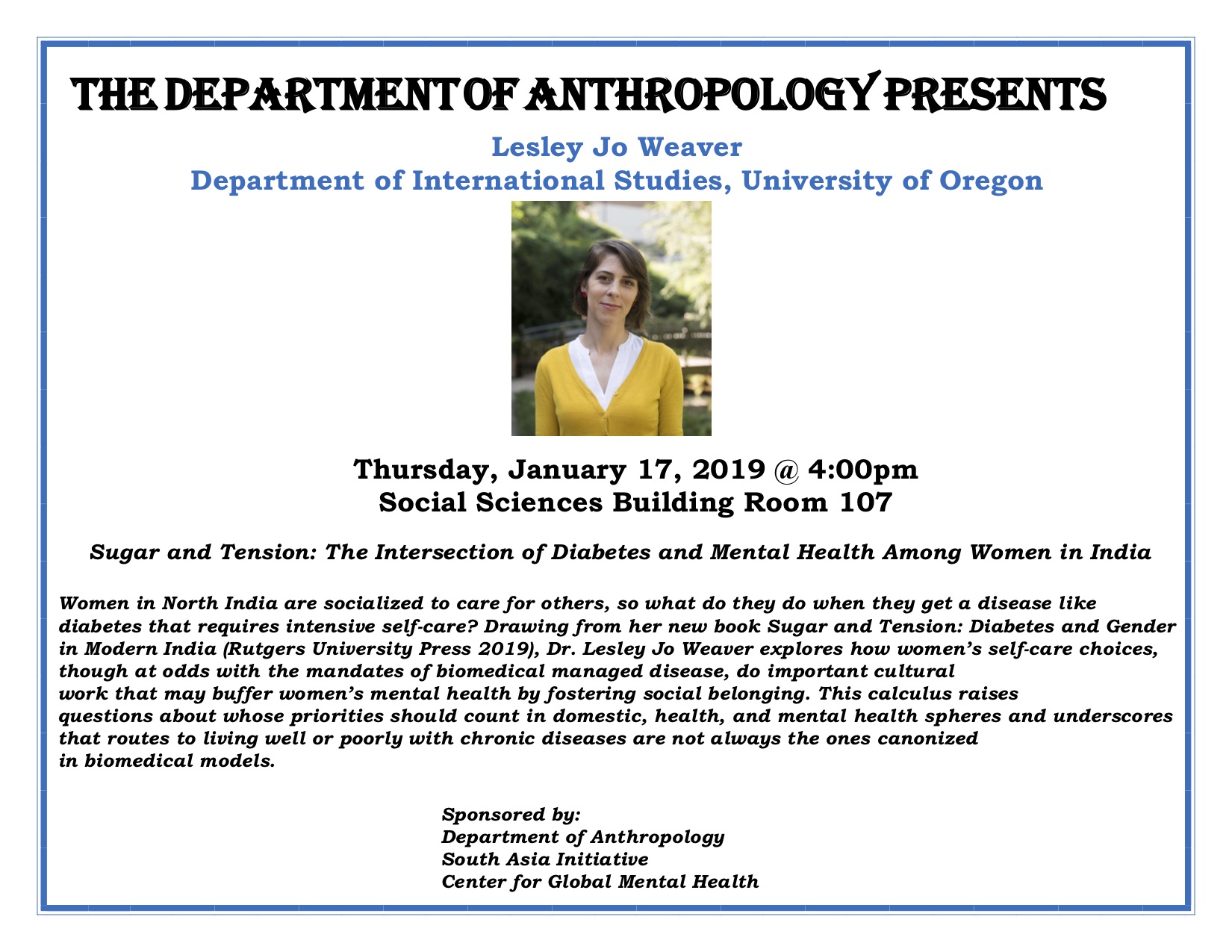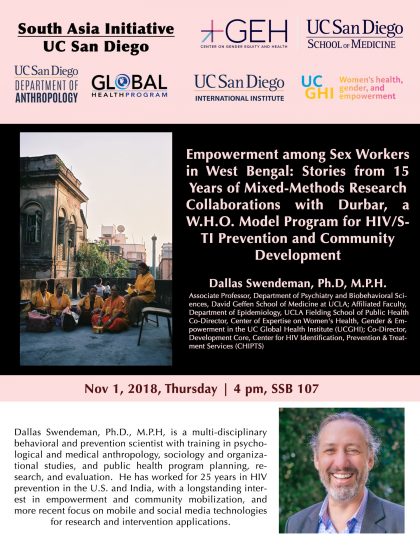Here are some flyers of our past events throughout the years!
- Register at: bit.ly/dghconference
Fall Quarter 2020
Virtual Book Salon Featuring “The Occupied Clinic”
LIVE STREAM on December 4 2020, 10 am PST
Speakers: Michael Busch, Saiba Varma
Let’s Talk About Anti- Blackness
Recorded Event Link: https://drive.google.com/file/d/1cv8bJiKPakAyH4yNMTGas5XfKgBbcWBb/view
Friday, November 6 2020, 4:00 – 5:30 PST
Speakers: Anneeth Kaur Hundle, Maryam Ali, DJ Kuttin Kandi, Joy Lehaunani Enomot0

Spring Quarter 2020
Wednesday, 29 April 2020 @ 8pm
The Loft at UCSD: 9500 Gilman Drive, La Jolla, CA 92093
Koto visionary Yumi Kurosawa teams up with world-renowned tabla player Anubrata Chatterjee for a program that brings together two expressive musical traditions, bridging the cultures of Japan and India. The duo spin mesmerizing musical tales as they enchant the audience and reinforce the powerful idea of music as a means to enhance the collaborative spirit of our global community. Their performance illuminates the deep-rooted similarities of their craft while highlighting their affinity and respect for one another as virtuosic performers furthering their own timeless musical traditions.
Winter Quarter 2020
Countertechnologies at the Edgelands
Thursday, 20, 28-29 February 2020 @ 5PM
UCSD (see links below for details)
Co-sponsored by UCSD SAI
Launch event (Feb 20, 5pm, UC San Diego):
AI at the Edgelands: Data Analytics in States of In/Security
Keynote: Dr. Lucy Suchman (Lancaster University)
Suchman is a leading expert on the automation of war, having testified at the United Nations, as well as a SIGCHI Lifetime Achievement Award winner, former president of the Society for Social Studies of Science, and a member of the Advisory Board of AI Now. See the abstract, detailed schedule, and RSVP here
A panel following the keynote will discuss how data analytics and surveillance technologies already affect life in the San Diego and Tijuana region.
Community panel:
- Graciela Zamudio, Executive Director and Founder of Alma Migrante (Tijuana) will speak about data and human rights in Mexico
- Paul Khalid Alexander, Professor, City College, and Founder, Pillars of the Community (San Diego) will speak about the history of gang databases and surveillance
- Tina Givens, Driver and Organizer, Rideshare Drivers United (San Diego/Tijuana) will speak about data surveillance, algorithmic decision making, and gig workers
Conference (Feb 28, San Diego & Feb 29, Tijuana):
This AI-focused event launches our cross-border conference, Counter-technologies at the Edgelands (February 28 & 29, 2020) to be held in San Diego and Tijuana. For more details about the conference and registration, visit: https://www.eventbrite.com/e/counter-technologies-at-the-edgelands-conference-registration-87210724625
Co-sponsored by UCSD Institute for Practical Ethics, Design Lab, Division of Social Sciences, Communication, History, Anthropology, Ethnic Studies, Science Studies, Arts and Humanities, International Institute, Institute of Arts and Humanities, Halıcıoğlu Data Science Institute, SPACES, South Asia Initiative, Cross Cultural Center, Groundwork Books; and Instituto Municipal de Arte y Cultura (Tijuana).
Website: https://edgelandtech.ucsd.edu/
En español: https://edgelandtech.ucsd.edu/ia-en-tierras-limitrofes-inauguracion-y-conferencia-magistral-20-feb/
Generations of Asians in the U.S.: Gen Z and Competition in the New Millennium
Thursday, 27 February 2020 @ 5PM
Seuss Room, Geisel Library
Speaker: Shalini Shankar (Professor of Anthropology, Northwestern University)
More details to come…
Moral Security: Anti-trafficking and the Violence of the Humanitarian State in India*
Thursday, 12 March 2020 @ 5PM
SSB 107
Speaker: Kim Walters (Assistant Professor of International Studies, Cal State Long Beach)
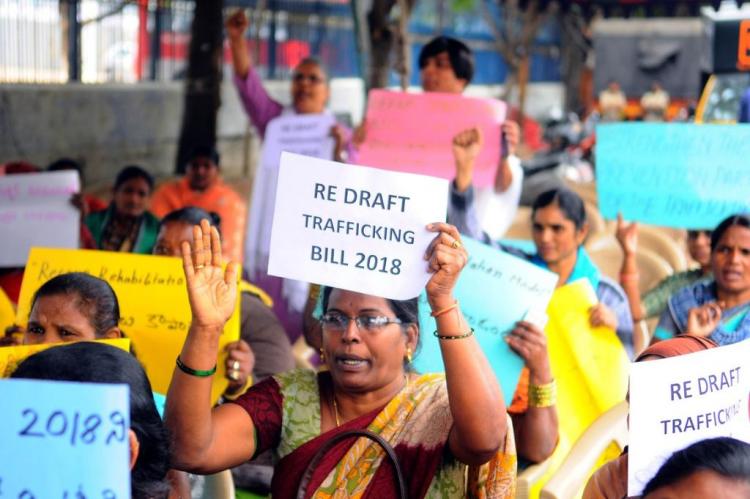
(Google Images)
The latest global panic over sex trafficking has animated a mode of global governmentality that has fused together otherwise contradictory registers of care and punishment in the disciplining of women who sell sex. This mode of governmentality, which I term moral security, foregrounds feminine sexuality as the site of greatest social risk and needful intervention. By conflating sex work with sex trafficking, moral security enables the humanitarian state to categorize all women who sell sex as victims requiring rescue, even if only from themselves. The urgency and fervor of the trafficking panic allows moral security to fuse together apparent contradictions into unwieldy amalgams: criminal-victim, forced rescue, and caring punishment. A patchwork of highly variable and often arbitrarily administered trafficking initiatives—whose largest sponsors are tech giants, Christian non-profits, and nation-states in the global north—taken in aggregate produce a state effect in which India as a whole is assessed, ranked, deplored, or petted by transnational philanthrocapitalists and other more powerful states. The state violence experienced by sex workers targeted by anti-traffickers becomes the basis for India’s claim to good governance within the framework of moral security. Action “against trafficking” is translated into numbers of shelters built, victims rescued, and families reunited, which provide easily legible metrics that add evidentiary flesh to the bones of India’s place in a global moral hierarchy of states.
*Postponed indefinitely due to COVID-19 Pandemic
For those who wait: Queues and Infrastructures in Manipur, North-East India
Thursday, 6 February 2020 @ 5PM
Spiro Library, SSB 269
Speaker: Nima Lamu Yolmo (PhD Candidate, Department of Anthropology, UC Irvine)
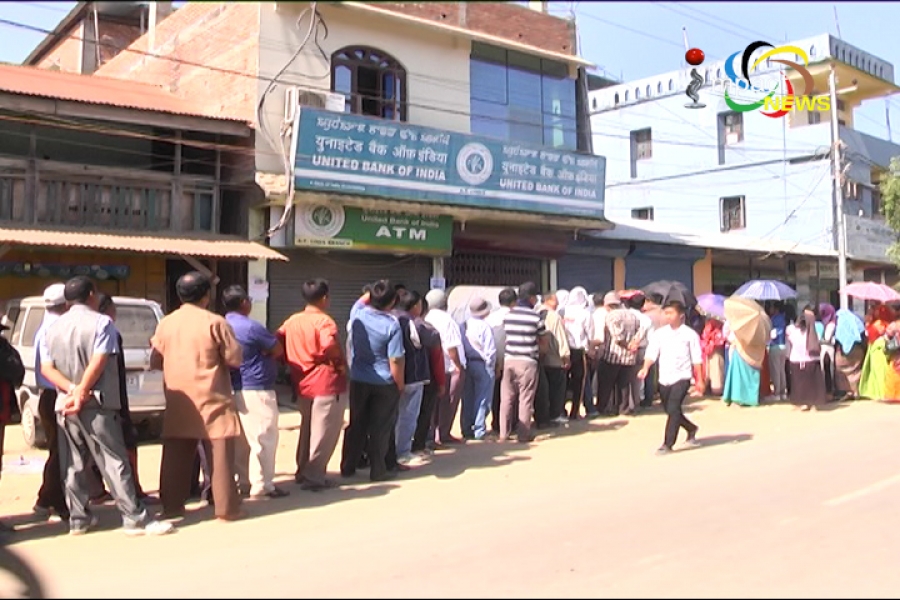
(Google Images)
Long hours of waiting in front of banks and ATMs to access money is a common phenomenon across the North-East region of India. In Manipur, one of the eight states comprising the region, the situation is further complicated by concerns related to economic breakdowns and political strife. Banks are regularly beset with “link-failure” and ATMs are replenished with cash only once a day for “fear of insurgents”. Those waiting in the long queues habitually exchange anecdotes and anxieties over access to cash, and conversations tend to meld seamlessly into concerns around rising commodity prices, state neglect, corruption, military action, human rights abuse, and taxations by armed groups. In this presentation, I draw from ethnographic research to show how these inordinately long lines and the ensuing conversations reflect a distinctive feature of infrastructural failure in Manipur that configures money, labor, time, sociality, and critiques of the state. Attending to the realities of money practices in Manipur affords us crucial insights to the workings of money infrastructures in post-colonial India where conflict and violence have infused state-led efforts to include citizens symbolically and materially into the market, time, and territory of the nation-state.
Citizenship and Protest: A Panel Discussion on India’s CAA
Monday, 3 February 2020 @ 5PM
Spiro Library, SSB 269
Speakers: Huma Ahmed-Ghosh (Professor Of Women’s Studies, SDSU), Gareth Nellis (Professor Of Political Science, UCSD), and Damini Pant (Graduate Student, UCSD)

(Google Images)
Moderator: Aftab Jassal (Professor of Anthropology, UCSD)
In December 2019, India’s Parliament passed the Citizenship Amendment Act. The Act sparked controversy for its use of religion as a factor to fast- track citizenship for asylum seekers in India. Since its passage, there have been mass protests, largely led by students in Indian universities. Join us for a lively discussion about the Act and its implications.
Managing the Radical (MtR): Participatory Action Research (PAR) Methods after Decolonize This (Workshop) and Innovation, Authentic Creativity, and Jugaad [Everyday Hacking] (Talk) with Amit Rai
Working with performance artists, arts administrators, mental health professionals and researchers, creative industries strategists, precarious creatives, we focused on: Care, Self-Organising, Corruption, Ethics, and Power in “Live Art.” What happens to these forms of cultural experience in the frameworks of decolonising media?
What forms of management, self-organization, and administration have emerged in this field of experimental performance art? With what value chains and forms of resistances?
Abstract: Jugaad is the Hindi/Punjabi word for work-around or everyday hacking. jugaad is an everyday image of autonomist ‘refusal’, or postcolonial mimicry: a non-linear sensorimotor circuit of habituation and techno-perceptual morphogenesis. in so far as digital media/mobile phone jugaad, in neoliberal design and innovation ideology, is tied to a kind of inauthentic innovation, something just short of innovation, or something that may precede it, jugaad is always the representation of a failed or proleptic digital entrepreneur, as such jugaad is a kind of detour away from what authentic innovation is imaged to be. This talk will attempt to assemble through a series of approximations an abstract diagram or metamodel of contemporary digital media and capitalist modes of value capture in Platform Capitalism in Hindutva India.
Fall Quarter 2019
Encounters: Carnatic-Hindustani Jazz
Monday, October 7, 2019, 5:30-7pm
Conrad Prebys Music Center Room 127
A conversation featuring jazz musician Rudresh Mahanthappa, Revathi Subramaniam (India Fine Arts Academy of San Diego), Anthony Davis (UCSD Music), David Borgo (UCSD Music), Mark Dresser (UCSD Music).
Co-sponsored by: the South Asian Studies Minor Program/SAI, UCSD Department of Music, and the India Fine Arts Association of San Diego (IFAASD).
Find More Information on the Facebook Event
Watch a 2010 performance featuring Rudresh Mahanthappa, featuring Gerry Hemingway and Mark Dresser: The Mauger Trio at the UCSD Loft.
To learn more about the performers and their art, check out this exclusive podcast:
Rudresh Mahanthappa’s Indo-Pak Coalition With Rez Abbasi & Dan Weiss (Co-sponsored with ArtPower)
Tuesday, October 8, 2019 at 8pm
The Loft at UCSD: 9500 Gilman Drive, La Jolla, CA 92093
Few musicians share the ability of Rudresh Mahanthappa to embody the expansive possibilities of his music with his culture. He is an alto saxophonist and composer who materializes a sound that hybridizes progressive jazz and South Indian classical music in a fluid and forward-looking form that reflects Mahanthappa’s own experience growing up as a second-generation Indian-American.
The Indo-Pak Coalition, featuring Pakistani-American guitarist Rez Abbasi and percussionist Dan Weiss, blends the sounds of jazz with Mahanthappa’s South Indian roots, creating a new and sublime complexity of sound. The result is a fiery jazz with Indian-Pakistani influences and a modern touch.
Watch a 2010 performance featuring Rudresh Mahanthappa, featuring Gerry Hemingway and Mark Dresser: The Mauger Trio at the UCSD Loft
“The Brahminical Colonial Occupation of Kashmir by India: What’s Caste Gotta Do With Colonialism?”: A Talk by Huma Dar
Wednesday, October 30, 2019, 3-5pm
Social Sciences Building (SSB) Room 107
Cargoes in the Pre-modern Indian Ocean: Bearings on South Asian History: A Talk with Ranabir Chakravarti
Wednesday, November 6, 2019, 4-6pm
Computer Science and Engineering Building (CSEB) room 4262
Dr. Chakravarti is a Professor of Ancient History at the Centre for Historical Studies, Jawaharlal Nehru University in New Delhi, India. He specializes in the economic and social history of early India with a particular interest in the history of maritime trade in the Indian Ocean (prior to c. 1500 CE). Chakravarti has authored and/or edited: A Sourcebook of Indian Civilization (Orient Longman, Hyderabad, 2000), Trade in Early India (OUP, New Delhi, 2005), Trade and Traders in Early Indian Society (Manohar, New Delhi, 2007, second edition), Indo-Judaic Studies in the Twenty First Century, a View from the Margins (Palgrave MacMillan, New York, 2007) and Exploring Early India up to c. AD 1300 (Primus, New Delhi, 2016). Chakravarti is a recipient of the Commonwealth Fellowship, a Fulbright Fellowship, and a member of the Institute for Advanced Study, Princeton University. He was also a Fellow-in-Residence at the Netherlands Institute for Advanced Study. In 2011, Chakravarti was elected President of the Ancient India section of the Indian History Congress.
Polluting the Ganges: A Book Reading and Discussion of Ganges: The Many Pasts of an Indian River with Sudipta Sen
Monday, November 18, 2019, 4-6pm
Geisel Library, Seuss Room
Ganges: The Many Pasts of an Indian River by Sudipta Sen (Yale University Press, 2019) is an exploration of the idea of a cosmic, universal river at the interstices of religious belief, historical geography, and ecology jeopardized by climate change and environmental pollution. Comment by Dr. Matthew Herbst, Director of the Modern World Writing Program.
Co-sponsored by: the UC San Diego Library, SAI and the South Asian Studies Minor Program, the Eleanor Roosevelt Making of the Modern World Writing Program, and supported by funding from the International Institute.
Sudipta Sen is Professor of History at the University of California, Davis. A scholar of India and the British Empire, his work has focused on the early colonial history of British India. He is the author of two books, Empire of Free Trade: The English East India Company and the Making of the Colonial Marketplace (University of Pennsylvania Press, 1998) and Distant Sovereignty: National Imperialism and the Origins of British India (Routledge, 2002).
Aakash Odedra Company: Rising (Co-Sponsored with Art-Power)
Tuesday, December 3, 2019 at 8pm
David and Dorothea Garfield Theatre at the Lawrence Family Jewish Community Center: 4126 Executive Dr, La Jolla, CA 92037
One of the most exciting young contemporary dancers and choreographers in the UK, the “simply breathtaking” (Globe and Mail) Aakash Odedra takes the stage in the captivating solo Rising with choreography from acclaimed international artists Akram Khan, Sidi Larbi Cherkaoui, Russell Maliphant, and Odedra himself.
In Rising, Odedra draws on his background in the classical Indian dance disciplines of Kathak and Bharatanatyam while remaining intrinsically contemporary in style and concept. Exploring different processes and aesthetics in the pieces created for Rising, Odedra highlights different aspects of himself to create a new personal language: lyrical and graceful, brutal and raw, edgy, and animalistic.
Expendable Bodies and Ethical Crisis: A Talk with Saveetha Meganathan
Wednesday, December 4, 2019, 3-5pm
Computer Science and Engineering Building (CSEB) room 4262
This paper presents an ethnography of the Koya tribal community in the context of ‘the practice of bioethics’ in Khammam district of Telangana (South India), with respect to a Post Licensure Observational Study of the HPV immunization programme. The paper includes a discursive attempt at understanding the donor and recipient relationships of aid in the public health sector in India.
Saveetha Meganathan is a Visiting Scholar at the UCSD Institute for Practical Ethics and a research scientist at the Tata Institute for Genetics and Society in Bangalore, India. She has consulted for Give2Asia, a nonprofit helping communities meet philanthropic goals. At the Institute, Saveetha will research the ethics of gene drives as it relates to India.
Spring Quarter 2019
Tue, Apr 9, 2019: Thenmozhi Soundararajan (Executive Director of Equality Labs) & Anasuya Sengupta (Co-Director of Whose Knowledge?), and Lilly Irani (UC San Diego Communication), Decolonising Knowledge and the Internet: the Dalit Bahujan experience.
5:00 – 6:30 pm, Geisel Library, Seuss Room
Co-sponsored by The Library, UC San Diego
This event is free and open to the public. Light refreshments will be served.
To request an accommodation, contact Lilly Irani at lirani@ucsd.edu. This event is wheelchair accessible. Service animals specifically trained to assist with a disability are welcome.
Thu, Apr 18, 2019: Vishnu Venugopalan (Indian Administrative Services) on Tackling Development and Governance Challenges: The case of Skills Development and Infrastructure Projects in South India.
4-6 pm, SSB 107
Co-sponsored by the Rady School
.
Thu & Fri, May 9-10, 2019: Krishnendu Ray (Columbia), talk on Cultural Politics of Taste and the South Asian Diasporic Community; workshop on South Asian food.
Lecture: Thu, 3-5 pm, SSB 107
Workshop: Fri, 12-2 pm, SSB 269
Co-sponsored by the International Institute Food Group.
Bio: Krishnendu Ray is the Chair of the Department of Nutrition and Food Studies at NYU. He was a faculty member and the Associate Dean of Liberal Arts at The Culinary Institute of America. He is the author of The Migrant’s Table (2004), The Ethnic Restaurateur (2016), and the co-editor of Curried Cultures: Globalization, Food and South Asia (2012). His most recent work is on street vending in global cities with attention to questions of law, livelihood, and liveliness of cities.
Mon, May 13, 2019: Gaurav Khanna (UC San Diego), Economics of Reservation in India.
5-6:20 pm, PETERSON 110
Co-sponsored by Economics.
Bio: Gaurav Khanna is an assistant professor of economics at the School and a non-resident fellow at the Center for Global Development. His research focuses on development economics, labor economics and applied econometrics. Many of his current projects concentrate on education policy, high-skill immigration, infrastructure, public-works programs and conflict.
Prior to joining UC San Diego, Khanna was a postdoctoral fellow at the Center for Global Development in Washington, D.C. and a consultant for the World Bank’s Poverty and Inequality Unit.
Tues, May 14, 2019: Dr. Prashant Bharadwaj, Arushi Kaushik and Gordon McCord, Long Term Impacts of In Utero Exposure to the Bhopal Gas Disaster
2-3:00 PM
Medical Education and Telemedicine (MET)145
Tues, May 14, 2019: Professor Gabriela Soto (Harvard University), (Re)Locating Known Histories of Science to the South: The Case of Hybrid Seeds in Mexico
3:30-5 pm, Institute of Americas, Deutz Room
Co-sponsored by the Dept. of History, Center for US-Mexican Studies, Division of Arts & Humanities, Science Studies, International Institute, Institute of Art & Humanities, CILAS
Thu, May 16, 2019: Munis Faruqui (UC Berkeley), “All the Emperor’s Eunuchs: Situating the Rise of Imperial Eunuchs in Late 17th Century Mughal India.
5:30-7pm, SSB 107
Co-sponsored by the South Asian Arts Council at the San Diego Museum of Art and the International Institute, UCSD.
Abstract: This talk examines the growing importance of imperial eunuchs during Emperor Aurangzeb’s reign (1658-1707). Although eunuchs played an important role in the Mughal Empire from the middle of the sixteenth century onwards, Emperor Aurangzeb relied more heavily on eunuchs to press imperial goals than previous Mughal rulers. This dependence increased as he aged as well as faced political and military challenges on multiple fronts. This talk offers the first serious scholarly attempt to grapple with the complicated and long overlooked role of imperial eunuchs during Aurangzeb’s reign and in seventeenth-century Mughal India.
Thu, May 23, 2019: Dr. Inshah Malik, Kashmir (Cashmere) is not a sweater: An Introduction to the politics, culture and the history of the region
5-7 PM, SSB 107
Co-sponsored by the International Institute, Anthropology Department, and the Institute of Art &Humanities
Abstract: Kashmir region suffers due to neglect caused by disinformation about its history, culture and politics. The understanding about the region is marred by complex political posturing of India and Pakistan which further obscures the pathology of incessant war and oppression in the region. In this lecture, we will look at political birthing of Kashmir, postcolonial crises and continued oppression and violence in the region. We will also examine Kashmir’s post-1947 political life, underlining various movements of self-determination and what makes them different from movements elsewhere. Such an understanding allows for an alternative political consciousness to emerge that forms the basis of resistance politics. We will further dwell into the role that women have played to sustain such a consciousness and how early fractures in the political consciousness exposed the failures in the postcolonial project of nation making. Furthermore, we will be acquainted with how such failure in nation-making aids continued war in the region.
Thu, May 30, 2019: Syed Akbar Hyder (UT Austin), One in Grief: Quratalain Hyder and Urdu Cosmopolitanism
3:30-5 pm, SEQ 103
Co-sponsored by the International Institute, UCSD & Third World Studies.
Tue, Jun 4, 2019: Screening of the Rough Cut of Louis Kahn’s Tiger City with director Sundaram Tagore.
5:30-7:30 pm, CALIT2 Atkinson Auditorium
Co-sponsored by Qualcomm Institute, South Asia Studies Minor, UCSD, and Sixth College, UCSD.
Abstract: Tiger City is a feature length film with actress Debra Winger and Indian architect Balkrishna Doshi that explores the impact of Salk Institute architect Louis I. Kahn upon South Asia’s built design. The film follows the creation of Kahn’ s less-known magnum opus, the National Assembly Complex in Dhaka, Bangladesh in the context of that nation’s war for independence.
Tiger City’s director, Sundaram Tagore, will be present to discuss a rough cut of the film. He is an art historian, award-winning filmmaker, and owner of the Sundaram Tagore Galleries in New York, Hong Kong, and Singapore.
Winter Quarter 2019
Thu, Jan 10, 2019, 5 pm, SSB 107: SAI Winter Mixer.
Thu, Jan 10, 2019: Ruvani Fonseka (Public Health, UC San Diego/SDSU), Addressing Reproductive Coercion in Bangladesh: Lessons learned from adapting the ARCHES intervention.
4-5 pm, SSB 107.
Abstract: Reproductive coercion refers to a set of specific behaviors, most often perpetrated by male partners, to control women’s fertility and interfere with contraceptive use. Reproductive coercion is associated with intimate partner violence and contributes to negative reproductive health outcomes such as unintended pregnancy and unsafe abortion. However, few evidence-based interventions exist that address reproductive coercion and intimate partner violence in low and middle-income country contexts. Addressing Reproductive Coercion in Health Settings (ARCHES) is a brief clinical intervention designed to provide education, targeted-support, and empowerment to women facing reproductive coercion or intimate partner violence. In two U.S. National Institutes of Health-funded randomized controlled trials, a single exposure to ARCHES significantly reduced pregnancy coercion and increased women’s self-efficacy to use contraceptives despite partner opposition. The UCSD Center on Gender Equity and Health, in collaboration with Ipas International and local health organizations, has adapted the ARCHES intervention for use by family planning providers in Bangladesh. The multi-step adaptation process funded by the Bill and Melinda Gates Foundation included conducting interviews and focus group discussions with family planning clients and providers at community-based clinics in Bangladesh, and creating a provider toolkit for implementing ARCHES in low- and middle-income settings. This session will share insights from the formative research used to adapt ARCHES to the Bangladesh country context. This adaptations will inform ongoing efforts to adapt ARCHES for use in other high-need environments, building local capacity to address reproductive coercion and intimate partner violence in global health settings.
Thu, Jan 17, 2019: Lesley Jo Weaver (International Studies, Oregon), Sugar and Tension: The Intersection of Diabetes and Mental Health among Women in India.
4-5:30 pm, SSB 107
Co-sponsored by Anthropology.
Thu, Feb 14, 2019: Reetika Khera (Economics and Public Systems, IIM Ahmedabad), The Promise and Pitfalls of Big Data for Service Delivery in India: A Discussion with Reetika Khera and Karthik Muralidharan.
3:30-4:50 pm, Center 105
Co-sponsored by Economics.
Wed, Feb 20, 2019: Sumandro Chattapadhyay (The Centre for Internet and Society), Deregulation by Code.
4-5:40 pm, CSE 1202
Co-sponsored by Institute for Practical Ethics, Halicioglu Data Science Institute, Science Studies, Department of Communication, Design@Large.
Abstract: At an event organised by The IndUS Entrepreneurs in August 2015, Nandan Nilekani offered this provocation: ‘are we at a WhatsApp Moment in finance?’ In this paper, I explore the meaning and significance of the notion of ‘WhatsApp moment’ in Indian banking, and document how the conditions of actualisation of this moment have been produced through a series of policy-legislative changes on one hand, and introduction of enabling software infrastructure for digital payments on the other.
I argue that the ‘WhatsApp moment’ refers to the _unbundling_ of an industry. Here, unbundling indicates at breaking up of an industry into separate constituting parts that can then be turned into independent, and often differently regulated, sub-industries of their own. In the Indian banking context, I study how (digital) payments as a service formerly offered by established banks and some telecommunication companies got separated out from the larger industry of banking and financial services to become an industry in itself, which saw rapid entry of various new payments processing companies – from Alibaba-linked PayTM, to payments apps from e-commerce giants (Amazon Pay and Walmart-owned PhonePe), to payments apps from mobile device/OS companies (Samsung Pay and Google Pay).
I trace how specific changes in policy design (for digital financial inclusion) and technological design (of national payments systems) came together to reconfigure the digital payments market in India and to produce a newly regulated marketplace of competing digital payments players. This techno-legal redesigning of the market for digital payments services has led to general deregulation but not without introducing various regulatory controls(-by-design). I will conclude the paper with a discussion of these controls and their implementation through technical/legal design decisions, and contradictions thereof.
Tue, Feb 26, 2019: Rohini Pande (Harvard John F. Kennedy School of Government) on How Does Conflict Affect Political Selection? Evidence from Nepal’s People’s War.
3:30 – 5 pm, GPS 3202
Co-sponsored by Economics.
Abstract: The political consequences of civil war are among the most important but least understood of all war impacts. In 2015, after a decade-long conflict and nine years of negotiation, Nepal abolished its 240-year-old monarchy and promulgated a new constitution formalizing Nepal’s political structure as a federal republic. The 2017 local elections ushered more than 30,000 new politicians into office with historically disadvantaged ethnic groups more likely to be represented in constituencies which experienced more conflict. Using a census of 3.68 million Nepalis across eleven districts, party nomination lists, and data on the universe of candidates and elected politicians, we comprehensively document patterns of political selection in these elections. First, politicians are better educated and richer than the populations they represent, but that they come from representative family backgrounds. Overall, these patterns of political selection in modern Nepal bear some qualitative resemblance to those in consolidated western democracies. Second, we see significant political representation of castes that had been largely excluded from representation in elections prior to the conflict. The Maoist party – which led the armed conflict – has the broadest ethnic base of potential candidates and the party most likely to select candidates from excluded castes. This potentially reflects the longer-run impacts of the parallel political structures, which sought to empower historically disadvantaged castes, that the Maoists created in the regions that they controlled during the conflict. Finally, using close elections in 2017 and data on the receipt of earthquake housing transfers we show that political representation enables policy inclusion.

Fri-Sun, Mar 1-3, 2019: Centering the Margins: Conversations with Writers of Color conference.
Fri, Mar 1, 7 pm – 9 pm, Central Library
Sat, Mar 2, 9:30 am – 7 pm, Cross Cultural Center
Sun, Mar 3, 9 am – 4 pm, Central Library
Co-sponsored by the San Diego Public Library Humanities Section, UC San Diego’s SPACES and the Cross Cultural Center.
Full schedule and (free) registration here.
CONFERENCE SCHEDULE, PANELS, SPEAKERS
FRIDAY, MARCH 1 | SAN DIEGO CENTRAL LIBRARY
OPEN MIC NIGHT & MUSICAL PERFORMANCE BY Charmaine Clamor
Friday, March 1 | Neil Morgan Auditorium, San Diego Central Library | 7:00 pm
SATURDAY, MARCH 2 | CROSS CULTURAL CENTER, UC SAN DIEGO
PLENARY SPEAKER: Lee Ann Kim
Saturday, March 2 | Cross Cultural Center, UCSD | 9:15 am
Panel: GO TELL IT ON THE MOUNTAIN
Saturday, March 2 | Cross Cultural Center, UCSD | 9:25 – 11:15 am
Moderator: Zeinabu Irene Davis
Panelists: Jill Cowan, Thelma Virata de Castro, Troy Espera, Sarika Mehta, Jennifer Pun
Panel: FRESH OFF THE BOAT VS HOMEGROWN
Saturday, March 2 | Cross Cultural Center, UCSD | 11:30 am – 1:00 pm
Moderator: Marivi Soliven
Panelists: Huda Al Marashi, Naomi Hirahara, Kat Tanaka Okopnik, Irene Suico Soriano
Panel: THAT COMPLEX CONFLUENCE OF IDENTITIES: WRITING FROM AND ACROSS MULTIPLE IDENTITY CATEGORIES
Saturday, March 2 | Cross Cultural Center, UCSD | 2:30 – 4:00 pm
Moderator: Brandon Som
Panelists: Julayne Lee, Jenn Soriano, Miranda Tsang
Panel: CRAFTING THE UNTOLD TALE
Saturday, March 2 | Cross Cultural Center, UCSD | 4:30 – 6:00 pm
Moderator: Namrata Poddar
Panelists: Madhushree Gosh, Jason McCall, Barbara Mhangami-Ruwende, Jason Magabo Perez
DINNER | 6:00 – 7:00 PM
OPEN MIC NIGHT
Saturday, March 2 | Cross Cultural Center, UCSD | 7:00 – :00 pm
SUNDAY, MARCH 3 | SAN DIEGO CENTRAL LIBRARY
Panel: ACTS OF WAR
Sunday, March 3 | Neil Morgan Auditorium, San Diego Central Library | 9:30 – 11:00 am
Moderator: John D. Blanco
Panelists: Hope Wabuke, Donna Miscolta, Ari Honarvar, Karen Llagas
Panel: HOW TO PROSPER AT PUBLISHING
Sunday, March 3 | Neil Morgan Auditorium, San Diego Central Library | 12:00 – 2:00 pm
Moderator: Claire Light
Panelists: Neelanjana Banerjee, Stefanie Sanchez von Borstel, Hiram Sims
SUNDAY, MARCH 3 | 2:30 PM | END OF CONFERENCE
Thu, Mar 7, 2019: Gareth Nellis (Political Science, UC San Diego), D ominant Parties and the Origins of India’s Weakly Institutionalized Party System.
ominant Parties and the Origins of India’s Weakly Institutionalized Party System.
12-2 pm, SSB 107.
Abstract: Why are party systems well-institutionalized in some settings, and chronically weak in others? I argue that unstable party systems are more likely to arise in regions where nationally dominant parties monopolize political competition at the onset of mass-franchise democracy. Dominant parties crowd out political opposition. Hence the eventual breakdown of a dominant party entails the severing of party-voter linkages locally. In the resulting vacuum, politicians face uncertainty about the electoral prospects of newly emergent parties. This leads to a collective action dilemma whereby candidates defect from expanding parties and sort instead into smaller, fragmentary ones. Consequently, stable party systems fail to take hold. Subnational evidence from India buttresses the theoretical argument. The success of the once-dominant Congress Party during the country’s inaugural elections (1951–2) robustly predicts greater electoral volatility in the decades following the decline of one-party dominance in the 1970s. Differential patterns of nationalist mobilization during the colonial period provide additional support for the paper’s claims. Overall, the findings imply a striking paradox: dominant parties that help “bind the nation together” during democracy’s initial stages sow the seeds of long-run political instability.
Tue, Mar 12, 2019: Saurabh Dube (Centre for Asian and African Studies, El Colegio de México) on Imaginaries and Iconographies: South Asian Modernisms and a Dalit Expressionism.
2-3:30 pm, Dept of Literature 155
Co-sponsored by Third World Studies.

Fri, Mar 15, 2019: Lucinda Ramberg (Anthropology & Program in Feminist, Gender & Sexuality Studies, Cornell), Dalit Futures and Sexual Modernity.
12-2 pm, SSB 107.
Co-sponsored by Program for Religion, Anthropology & Critical Gender Studies.
Abstract: Following the call of Dr. B.R. Ambedkar, many Dalits have converted to Buddhism as means of escape from the stigmatization attached to “untouchability.” Drawing on 18 months of ethnographic research, I consider the sexual politics of this movement in relation to the temporality of stigma. In particular, I investigate the widely held notion that women in particular find it difficult to break from ancestral religion through interviews with Buddhist women who continue to keep ancestral gods and ethnographic descriptions of weddings in which Buddhist and Hindu rituals are mixed. Drawing on conversations within feminist and queer theory about the distribution of social life and death through reproductive futurism as well as critiques of representations of native others as stuck in the past within postcolonial theory, I elaborate how Dalits work to elude the time set for them by others.
 Thu, Mar 21, 2019: Radhika Govindarajan (Anthropology, Washington), More-Than-Human-Democracy: On the Political Lives of Cows, Rivers, and Mountains in Contemporary India.
Thu, Mar 21, 2019: Radhika Govindarajan (Anthropology, Washington), More-Than-Human-Democracy: On the Political Lives of Cows, Rivers, and Mountains in Contemporary India.4-6 pm, SSB 107.
Co-sponsored by Anthropology and Science Studies.
Abstract: This talk draws on ethnographic fieldwork among gau-rakshaks (cow-protectionists) and ordinary villagers in India’s Central Himalayan state of Uttarakhand to explore the possibilities and limits of more-than-human politics. It seeks to understand how the specific terms on which nonhumans are recognized as political actors shapes the politics of more-than-human politics. More specifically, this talk asks what is at stake for right-wing cow-protectionists in having the cow constitutionally reclassified as “mother” instead of “animal”. What does this particular gesture of kinship allow us to understand about the dark side of seemingly expansive political movements grounded in human kin relations with what might be called “nature”? In this talk, I argue that the grounding of this more-than-human politics in majoritarian ideology not only authorizes violence against those who are deemed enemies of a nation united around the figure of the mother-cow, but also fetishizes and naturalizes feminized bovine bodies and labor in ways that end up entrenching human domination over nature.
Other Campus Events
Mon, Jan 14, 2019: Anirban Baishya (Division of Cinema and Media Studies, University of Southern California), “Best Face Forward”: Selfies and Digital Popular Culture in Contemporary India.
12:30 – 2 pm, MCC 127.
Dept of Communications Colloquium.
Wed, Jan 23, 2019: Kuhu Tanvir (Pittsburgh), Counterfeit Culture: Bollywood on Cellphone Screens in the Time of Globalization.
12:30-2pm, MCC 201.
Department of Communications Colloquium.
Thu, Feb 7, 2019: Jose Ignacio Cabezon (Santa Barbara), What is a Woman? What is a Man? Exploring The Buddhist Sources.
6pm, Great Hall at the International House, Eleanor Roosevelt College.
Sponsored by The Burke Lectureship on Religion and Society. Register here.
The ancient Buddhist sources have a great deal to say about what it means to be a biological man or woman, what it means to be gendered male and female, what kinds of desires and sexual practices are considered normative, and what kinds deviant. But this material is scattered throughout hundreds of different texts and is found in no single source. Drawing on decades of research into the classical Indian and Tibetan Buddhist texts – and on the extensive literature on ancient theories of “queerness” – Cabezon traces the life of a man and woman from conception to death, in the process laying bare Buddhist assumptions about what it means to be normal and abnormal and why these issues were so important to ancient authors.
Jose Cabezon is Dalai Lama Professor of Tibetan Buddhism and Cultural Studies at the University of California, Santa Barbara, and president-elect of the American Academy of Religion. The author or editor of eighteen books and dozens of articles, Cabezon has a wide range of scholarly interests, from Indian Buddhist philosophy to Tibetan history to the academic study of religion. His latest book, Sexuality in Classical South Asian Buddhism (Wisdom Publications, 2017) is the most extensive study of its kind ever published. The recipient of many honors, Cabezon was most recently awarded Guggenheim and ACLS fellowships for his forthcoming book Sera Monastery, a study of fifteenth-century Tibetan monastic academy.
Fri-Sat, Feb 15-16, 2019: Workshop on the Ethics and Policy Implications of Big Data.
Day 1 at The Forum at the Price Center; Day 2 at 15th Floor conference rooms (15A &B) at the Village.
Sponsored by the Halıcıoğlu Data Science Institute, the Institute for Practical Ethics and the Dean of Social Sciences.
The workshop will bring together social and computer scientists, other academics, activists, and practitioners interested in the ethics and policy implications of algorithms and Big Data. The purpose of the workshop is to explore the state-of-the-art and immediate horizons of algorithms, Big Data, and automation and their interface with the social sciences and ethical issues. The panels are set up to facilitate lively and wide-ranging discussion.
Full Schedule
Friday, February 15, 2019, The Forum at the Price Center
2:30-3:00 Welcome reception (light refreshments)
3:00-5:00
1. Panel: Knowledge and Culture
– How will human learning be altered and how should the education system respond to Big Data?
– How will art and the humanities be affected by Big Data?
– How will the social sciences change?
– How will natural science be done differently?
– What are the effects on popular culture?
Panelists
Cecilia Aragon, University of Washington-Seattle
Stuart Geiger, University of California, Berkeley
Johannes Himmelreich, Stanford University
William FitzGerald, The Worker Agency, and previously at Google
Moderator:
Juan Pablo Pardo Guerra, Sociology, UCSD
Saturday, February 16, 2019, The Village, Rooms 15A & 15B
8:30-9:00 Breakfast buffet
9:00-11:00
2. Panel: Fairness and Inequality
– What is algorithmic fairness? How are technical choices and substantive outcomes related?
– How do people make visible and contest the effects of data/algorithm regimes?
– To what extent are algorithmic predictions self-fulfilling prophecies?
– How does Big Data affect economic inequalities?
– Do algorithmic predictions lock the future into the past by overfitting on data from the past?
– Can Big Data help the disadvantaged?
Panelists:
Per-Erik Milam, University of Twente
Joan Donovan, Data and Society Institute, New York
Sumandro Chattapadhyay, Centre for Internet and Society, India
Moderator:
Akos Rona-Tas, Sociology, UCSD
11:00-11:15 Coffee break
11:15-1:15
3. Panel: Power and Privacy
– Are there limits to algorithmic predictions?
– Do humans have any ultimate comparative advantage over AI, and if they do, what would that be?
– Can algorithms make decisions about humans?
– How does Big Data alter power relations and change the way societies are governed?
– How is the design of algorithms and Big Data structures distributed across actors, institutions, and locales?
How does this distribution affect the resulting algorithms and their surrounding practices?
– Can algorithms help civic movements?
– Should we worry about profiling?
– How safe is Big Data in the face of hacking?
– Who benefits from loss of privacy?
Panelists:
Margaret Hu, Washington and Lee School of Law
Jack Poulson, Hodge Star Scientific Computing and previously at Google,
Reetika Khera, IIT, Delhi
Emory Roane, Privacy Rights Clearing House
Moderator:
Lily Irani, Communication, UCSD
1:15-2:15 Lunch break
2:15-4:30
4. Roundtable with the participation of all the panelists: Reigning in Big Data
– What are the main legal issues raised by Big Data?
– Is it too late for ethics in Big Data?
– Is regulation of algorithms possible/desirable?
– What are the national differences in Big Data regulations?
– Is data/algorithmic transparency possible?
– Should the design of algorithms/data structures include relevant stakeholders?
– What forms of data privacy are possible/desirable? Can surveillance be kept benign?
– Where should human judgment and deliberation yield to algorithmic decision making and where should it not?
– How should algorithms and Big Data become subject to scrutiny or audit?
– Who should be responsible for what an algorithm does?
– What can civic movements and social actors do?
Moderator:
Dana Nelkin, Philosophy, UCSD
More information here.
Fall Quarter 2018 SAI Events
Co-sponsored by Economics.
Abstract: Neuroscience has informed us how our brains optimally process information and take action to meet our goals. In this talk, Dr. Mishra will describe her research in developing digital technologies that translate this neuroscientific knowledge to serve Indian children with mental disorders. Her studies have been the first to understand how digital mental health tools benefit children in a global setting, and have focused on urban children with clinical disorders such as ADHD (attention deficit hyperactivity disorder) as well as abandoned children with traumatic early life experiences. These studies also highlight successful collaboration between our academic institutions with hospitals and non-profit organizations in India, and enhance translational research capacity across the domains of neuroscience, cognitive science, technology and mental health.
4 pm, SSB 107.
Abstract: In 1991, the W.H.O. funded a rapid appraisal and HIV prevention program in the Sonagachi red light area of Kolkata. In 1995, a process of community leadership and ownership was initiated with the establishment of the Durbar Mahila Samanwaya Committee (transl. Unstoppable Equal Women’s Committee) and its’ USHA Multi-Purpose Banking Cooperative (now the largest micro-banking cooperative in South Asia). This enabled “Durbar” to evolve into a “community-led structural intervention” that responds to priorities of sex workers and their families, such as economic security, education, human and workers’ rights, stigma and discrimination, police other power-broker abuses, and human trafficking, in conjunction with HIV/STI prevention efforts. Durbar has scaled up to over 60,000 sex workers and their families at 60+sites in West Bengal and served as a model for the Bill and Melinda Gates Foundation funded scale-up of HIV prevention in India, Project Avahan. This talk will highlight Durbar’s evolution, components and underlying functioning, and successes and challenges from over 15 years of mixed-methods research and training collaborations.
Mon, Oct 22, 2018: Brown bag discussion with Tarun Jain (Indian School of Business), Reshaping Adolescents’ Gender Attitudes: Evidence from a School-Based Experiment in India.
Cosponsored by Center for Gender Equity and Health.
12 – 1:30 pm, Skaggs Pharmaceutical Sciences Building 1186.
Refreshments will be provided, but bring your own lunch.
12 – 1 pm, Leichtag 107
OTHER EVENTS

Thu & Fri, 6th and 7th Dec, 2018: Sindhu Thirumalaisamy, MFA thesis film screening, The Lake and The Lake.
SME 149 (UC San Diego, Structural Materials Engineering Building, Matthews Ln, La Jolla)
Dec 6: 2pm, 3:30pm, 5pm.
Dec 7: 2pm and 3:30pm closing screening and reception.
The Lake and The Lake
Amidst the Special Economic Zones of India’s Silicon Valley is a place that is both a wasteland and a protected wetland. Depending on whom one stands with, the lake is home, work, waste, and a view. This film is in Bangla, Hindi, Kannada, English, and other (non-human) languages, subtitled in English.
Mon, Oct 29, 2018: Saiba Varma (Anthropology, UCSD) on The Shock Network: The Politics of Care in Occupied Kashmir.
4-5:30 pm, HSS 3027 (Reception from 4 pm)
Science Studies Colloquium Series.
Fri, Oct 12: Sri Lanka themed Friday Café.
There will be presentations on Sri Lanka from UCSD cultural ambassadors with ties to the country, including SAI grad student Ruvani Fonseka.
12-1:15 pm, Great Hall.
UC San Diego International House
Lunch – 5$ per person
More information here: https://global.ucsd.edu/deans-office/globally-focused-programming/friday-cafe/index.html
Oct 3, 2018: Secretary of the Indian Department of Telecommunications and Pacific Leadership Fellow Aruna Sundarajan (India Telecom Secretary), Digital India: Opportunities and Challenges
5 – 6:30 pm, The Ida and Cecil Green Faculty Club, Atkinson Pavilion.
Organized by Center on Global Transformation, GPS.
Free Registration here: https://www.eventbrite.com/e/digital-india-opportunities-and-challenges-tickets-50085385737
Spring/Summer 2018
Thursday, June 14: Navarasa Dance Theater performance, A Story and A Song launches the San Diego Museum of Art Epic Tales of Ancient India Exhibit. Co-sponsored by the Indira Foundation and the SDMA/Committee for Arts of the Indian Subcontinent. Location: San Diego Museum of Art – 1450 El Prado, Balboa Park, 7-8:30 pm. Tickets on sale soon: $45 (General admission); $25 (student/ID).
Thursday, June 7: Amrita Kurian (UCSD, Anthropology) In Search of Quality: The Politics of State-led Science on the FCV Tobacco Sector in Andhra Pradesh. Sequoyah Hall 103, 3:30-5pm.
Thursday, May 31: Sohaib Khan (Columbia, Middle Eastern, South Asian, and African Studies, and UCSD visiting student) ‘Let the Beard Grow and Trim the Mustache’: Muslim Ethics between Mimesis and Embodiment. Sequoyah Hall 103, 3:30-5pm

Friday, May 11: Scintillating Strings, a Carnatic Instrumental Concert with Ramana Balachandran (on veena), and Sumesh Narayanan (Mridangam). Presented by the Indian Fine Arts Academy of San Diego
7:30pm, QI Auditorium, Atkinson Hall
Free for UCSD Faculty, Staff, Students and IFAASD Members
$25 General Admission (purchase tickets online)
Please note: Parking is $3 at lot P502

Friday, May 25: R Radhakrishnan (UC Irvine, English) The Future of South Asian Studies. Comment by Babak Rahimi, Director of the Program for the Study of Religion and Third World Studies. Co-sponsored by the Indira Foundation, SSB 103, 12-1:30 pm.

Thursday, May 10th: Asim Khwaja (Harvard Kennedy School) Glass Walls: Experimental Evidence of Access Constraints Faced by Women. Presented by the Behavioral-Development Economics Seminar, co-sponsored by the South Asia Initiative. GPS 3106, 12-1:30pm

Friday, April 20: Samanth Subramanian (Journalist) “A Telescopic History of the Sri Lankan War” Co-Sponsored by the UCSD Library and the Indira Foundation. Seuss Room, Geisel Library, 3:30-5pm (Doors open at 3pm, Light refreshments provided)

Friday, April 6: Kaushik Basu (Cornell, Economics) Law, Economics and the Control of Corruption: A New Approach to Law and Economics. Moderated by Karthik Muralidharan (UCSD Economics). Co-sponsored by the Indira Foundation. MPR2, Rady School of Management, 12-1:30pm. (Lunch will be served).
OTHER EVENTS
Tuesday, Aug 28, 2018: Dr. Laishram Ladu Singh (Professor, Department of Mathematical Demography and Statistics, International Institute for Population Sciences), NFHS Survey: Designing and Executing a Nation-wide Public Health Survey for India.
Wednesday, June 13, 2018: Paryavaran Mitra (Friends of the Environment) Carving Path to Dignity, A talk by Ashish Agarwal, founder of Paryavaran Mitra
11:00 – 12:00 PM, CSE 1202
The speaker, Ashish Agrawal, founder-director of Paryavaran Mitra (Friends of the Environment) will talk about a social enterprise from Gandhi Ashram, India where poor rag-picking women play a crucial role in maintaining the cleanliness of the city yet earning a demeaning stature in society for this noble act. The emphasis of the talk will be on applying the entrepreneurial thinking and designing a self-sustainable business model which would allow overcoming prevalent issues like societal challenges, waste management, national policies, behavioral changes, women security, hygiene, social dogma, and others. The speaker will also discuss the results after being implemented for three successful years and unsolved challenges that lies ahead.
Winter 2018 SAI Events
Mar 15: “Borderlines: Telling South Asian and US-Mexico Border Histories through Art and Performance” with Sebha Sarwar (Artist/Writer), Yessica Garcia-Hernandez (UCSD Ethnic Studies) and Sindhu Thirumalaisamy (UCSD Visual Arts). Co-sponsored by the Sixth College Writing Program, Eleanor Roosevelt College, the International Institute, the UCSD Library, and the Committee for the Arts of the Indian Subcontinent (CAIS), San Diego Museum of Art. Seuss Room, Geisel Library, 5-6:30 pm.
Mar 8: Documentary screening and discussion of “Temple Nagaswaram” with Soudhamini Narayanan, (2017-8 Fulbright-Nehru Fellow and filmmaker, Cloth of Gold Films) and Kartik Seshadri (UCSD School of Music). Rady School of Management Rm 3E107, 4-6pm Co-sponsored by the Department of Music and the International Institute.
Mar 1: Vineet Pandey, “Online Systems to Enable Participatory Science and Collective Action” (UCSD CSE), SSB 107, 5-7pm
Feb 15: Documentary screening and discussion of “Wounds of Waziristan” with filmmaker and journalist, Madiha Tahir. SME 149, 4:30-6:30pm. Co-sponsored by the International Institute.
Jan 25: “Technology, Inequality, and Our World: Taking Back the New Media Revolution” Ramesh Srinivasan (UCLA School of Education and Information Studies). CSE 1202, 2-3:30pm. Co-sponsored by the International Institute and UCSD Design @ Large.
Jan 18: “Cardiometabolic Risk in South Asians: Findings from the MASALA Study” Alka Kanaya (UC San Francisco, School of Medicine) BRF-2 Rm. 2A03, 4-5:30 pm. Co-sponsored by the Dept. of Anesthesiology (UCSD School of Medicine) and the International Institute.
Jan 11: South Asia Initiative Mixer, SSB 231 (Spiro Library, Anthropology) 5-6:30 pm
Fall 2017 SAI Events
Nov 30: MV Ramana (University of British Columbia, Public Policy/Global Affairs) “Nuclear Weapons in India: History and Risk” Comment by Ahmed Abdulla (UCSD GPS). Co-sponsored with the International Institute. SSB 107 3:30-5pm.
Nov 9: Iffat Fatima (Delhi) Film Screening and discussion with filmmaker, Khoon Diy Baarav (“Blood Leaves its Trail”). Co-sponsored with the International Institute. SSB 107 4-6 pm.
Nov 2: “Tackling Malaria in South Asia” Round Table Discussion with Ethan Bier (UCSD Biology), Karthik Muralidharan (UCSD Economics) and Elizabeth Winzeler (UCSD Medical School). CALIT2 Auditorium, 4-6 pm (Event Video)
Oct 26: Vikram Chandra (UCB English) “The Geek Sublime,” Round Table discussion with Lilly Irani, (UCSD Communication), Shayan Mookherjea (UCSD ECE), and Sanjay Nigam (UCSD Medical School) Co-sponsored with Science Studies, the Warren College Writing Program, and the Marshall College Dimensions of Culture Program, with support of the Indira Foundation; Seuss Room, Geisel Library, 4-6 pm (Lecture Slides)
Michael Callen (UCSD Rady School) “Using Mobile Money to Reduce Corruption and to Improve Government Salary Payments in Afghanistan” SSB 107, 3:30-5 pm
Oct 12: Nadeen Karputly (UCSD Ethnic Studies) “Ayad Akhtar and the Burden of Muslim-American Representation” SEQ 103, 5-6:30 pm
Oct 5: South Asia Mixer, SSB 231 5-6:30 pm
OTHER EVENTS
November 2, 2017: “Climate Change and Religion”
Prof. Thomas Csordas, UC San Diego; Assistant Prof. Aftab Jassal, Colgate University and SAI affiliate; Prof. Karma Lekshe Tsomo, University of San Diego.
2:30PM, UCSD Price Center Forum
Oct 16: Lilly Irani (UCSD Communication & Science Studies)
Entrepreneurial Citizenship: Promising Knowledge and the Subsumption of Hope
4:00p-5:30p, Room 3027, Humanities & Social Sciences Building
“How do you get acquainted with 4 billion people?” This is a question posed by a “clean water” NGO that partnered with DevDesign, the studio where I conducted ethnographic fieldwork for 14 months. In this talk, I explain the rise of entrepreneurial citizenship in India — a call to citizens to take up the developmental work of a liberalizing state. I then turn to the work of DevDesign as they combined ethnography and design to produce not facts, but “opportunities” for global health public-private partnership. I outline how the entrepreneurial ethos and mode of development subsumes hope and disciplines development. The talk draws from my forthcoming book Innovators and their Others (Princeton University Press).
Sept. 20: Raj Reddy (Computer Science, Carnegie Mellon) “Creating a Humane Society through Computational Social Science” UCSD CSE Distinguished Lecture Series. 11am, Fung Auditorium, Powell-Focht Bioengineering Hall.
Spring 2017 SAI Events
June 1: Tia Rajan, Book talk for Urban Desi, UCSD Women’s Center Conference Room, 4pm
May 25: Waqas Butt, (UCSD Anthropology), “The Institutions and Infrastructures of Waste Disposal in Contemporary Lahore” International Institute Seminar Room, Sequoyah 103, 4-5:30 pm (4 pm reception; talk at 4:30).
May 18: Huma Ahmed-Ghosh (SDSU, Women’s Studies) “Contesting Feminisms: Gender and Islam in Asia” Sequoyah 103, 4-5:30 pm (4 pm reception; talk at 4:30 pm). Co-sponsored by the Indira Foundation.
May 9: Banu Subramaniam, (UMass Amherst, Gender Studies) “On the Making of the ‘Indian’ Genome” with comment by Vineet Bafna (CSE), and Brinda Rana, UCSD (Psychiatry/Medical School). CSE 4140, 4-6 pm Co-sponsored with UCSD Science Studies.
May 4: Sowparnika Balaswaminathan (UCSD, Anthropology) “A Proper Sculptor: Individuality, Belonging and Marginalization in a Tamil Caste Community” International Institute Seminar Room, Sequoyah 103, 4-5:30pm (4pm reception; talk at 4:30).
April 13: Vinay Lal (UCLA, History) “Climate Change and Insights from Hinduism” International Institute Seminar Room, Sequoyah 103, 4-5:30 pm (4 pm reception; talk at 4:30). Co-sponsored by the Indira Foundation.
April 4: Kamala Visweswaran (UCSD Ethnic Studies), “Democracy as the Sign of Corruption: Caste Reservation and Anti-Corruption Movements in India” Gusfield Memorial Lecture, Department of Sociology, Gusfield Seminar Rm, SSB 101, 12:30-2 pm.
Winter 2017 SAI Events
March 9: Aftab Jassal (UCSD, Religious Studies) “Making Place for God: Divine Embodiment and Ritual Healing in North India” International Institute Seminar Room, Sequoyah 103, 4-5:30 pm (4 pm reception; talk at 4:30 pm).
March 3: Abhijit Banerjee (MIT, Economics) “Democracy in India: Why Doesn’t it Deliver More?” MPR2 at Rady School of Management, 12:00pm-1:30pm. Co-sponsored by the Indira Foundation.
Feb. 3: Ali Asani (Harvard, Islamic Studies), “The Importance of Religious Literacy in a Cosmopolitan World” 12:30-2 pm; SSB 107. Lunch will be served. Co-sponsored by the Institute for Arts and Humanities, The Program in Middle-Eastern Studies, and the Center for Research on Educational Equity, Assessment, and Teaching Excellence (CREATE).
Jan 26: Prashant Bharadwaj (UCSD Economics), “Long Run Impacts of the Partition of India” International Institute Seminar Room, Sequoyah 103, 4-5:30 pm (4 pm reception; talk at 4:30 pm).

Jan 11: Kaushik Sunder Rajan (University of Chicago, Anthropology) “Scandal of the Trial: HPV Vaccines, Public Health and Knowledge / Value,” SSB 107, 11:30am -1:30 pm. co-sponsored by the Indira Foundation
Winter/Spring 2016 SAI Events
April 22nd, 2016: Satisfied Callers: Police, Corporations, and Documentation in India. Friday, April 22; 3:00-4:30 pm
SSB 269 (Spiro library)
State organizations are infamous for their insatiable appetites for documentation, but sometimes they refuse to produce documents. In India, police officers often refuse to register complaints and initiate proceedings. A recent project by police in the Indian state of Punjab has aimed to eliminate this practice. The state hired a private corporation to run a call center to take emergency calls to the police. Young, middle-class, educated women staff the phones and act as case coordinators, dispatching police in locations across the state and monitoring the progress of cases through an elaborate database that logs communication from victims and police documents. Procedures embedded in corporation software translates the government procedure into the language of customer service. This disjunct arrangement appears to be reshaping lines of authority and police practice.
Matthew Hull is an associate professor in the Department of Anthropology at the University of Michigan. His research focuses on the nexus of representation, technology, and institutions. His book, Government of Paper: The Materiality of Bureaucracy in Urban Pakistan (University of California Press, May 2012), examines governance as a semiotic and material practice through an account of the role of writing and written artifacts in the operations of city government in Islamabad. He has also worked on the deployment of American technologies of democracy in urban India from the late 1950s and early 1960s.

March 10, 2016: Writing Technology: (Un)disciplined Histories. Kavita Philip (History, UC Irvine); Benjamin Zachariah (historian and Research Fellow at University of Trier). March 10; 12pm-2pm, Catalyst Lab SME 204 ; Light refreshments provided.
April 4th, 2016: Film: “FOR THE LOVE OF A MAN”. Time: 4:30pm-6:30 pm; Location: TBA
Documentary film-screening and a roundtable discussion moderated by Kamala Visweswaran (Ethnic Studies); featuring Joyojeet Pal (filmmaker), Erica Cho (Visual Arts), Ashwin Kini (Literature) and Sowparnika Balaswaminathan (Anthropology). Detailed event description. See film trailer here.
OTHER EVENTS
May 17th, 2016: Temporalizing Cinema

May 4th, 2016: Jennifer Bussell; Location: SSB 104 ; Time: 12:30-2pm “Clients or Constituents? Citizens, Intermediaries, and Distributive Politics in India”
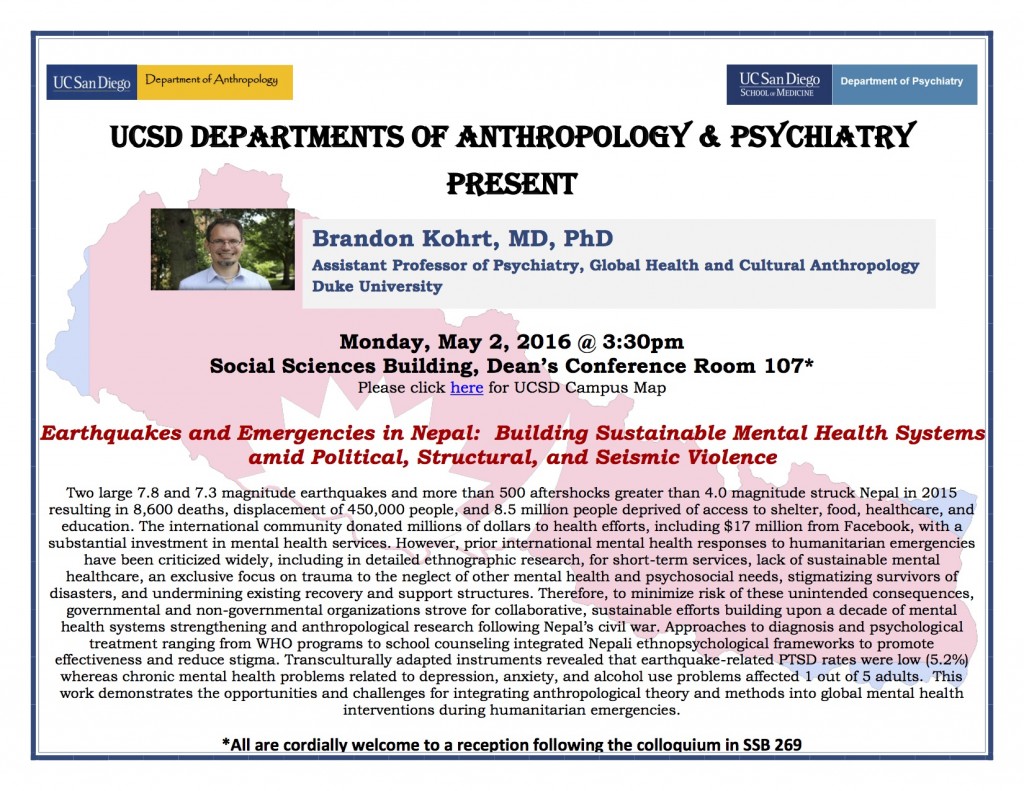
April 6th, 2016: Screening of Roots in the Sand . 12:00 p.m. – 1:00 p.m. Wednesday, April 6, 2016; Seuss Room, Geisel Library.









